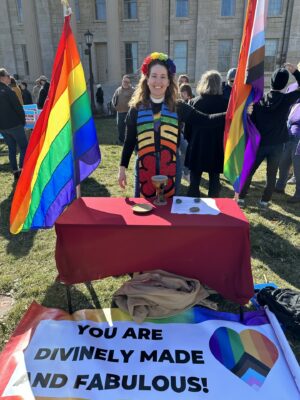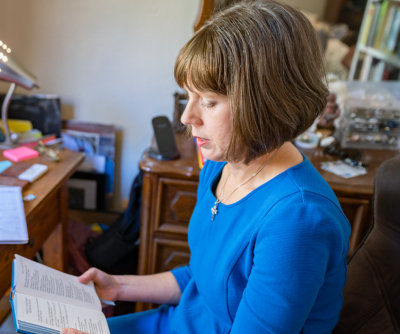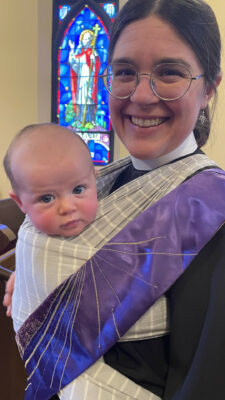Integration Every Day

Full-time ministry enriched seminary learning for these hybrid alums
By the Rev. Kyle Oliver, EdD
“There’s a joke in my cohort. We played a bingo game where we have little squares of things that you hear often at CDSP,” said the Rev. Katherine Frederick ‘23. “Hospice chaplain was one. Because I so often said, ‘In my work as a hospice chaplain …’ It was amazing how often that happened.”
Frederick wasn’t trying to get undue mileage out of one term’s worth of stories from clinical pastoral education. Quite the opposite—she is one of several Hybrid Program alums and students who worked or are working in full-time ministry positions during their CDSP formation. Thus, Frederick’s role at Providence Hospice in Napa Valley has, since mid-2020, been a constant source of inspiration, orientation, and reflection during her years in seminary.
I recently spoke with Frederick, the Rev. Nora Boerner ‘22, and the Rev. Jessica Frederick ‘23 (no relation to Katherine) for a series of episodes of Crossings Conversations about the experience of simultaneously working full-time ministry jobs and studying at CDSP.
In a sense, this series is a follow-up on Carly Lane’s piece “Low Residence, High Impact” from our Spring 2023 issue, in which she surveyed alums’ perspectives on the strengths of the Hybrid Program. Indeed, much of what I heard from this trio of leaders resonated with those earlier themes. Each mentioned the ways that residential formation wasn’t possible for their circumstances, as well as the strong bonds formed by hybrid cohorts from their very first onsite intensive— a “summer-camp-like experience,” according to Boerner.
But other themes emerged that were tied to the specific experience of undertaking seminary studies amid the daily joys and challenges of positions not unlike the ones for which they and their classmates were being formed.
Immersive and integrative learning
Katherine Frederick wasn’t the only such student making frequent connections between her studies and her day job.

“I know this will sound like hyperbole, but every single day that happened,” said Boerner, who served as parish life coordinator at Trinity Episcopal Church in Iowa City, IA, during seminary, then continued as curate and now associate rector.
“Sometimes I found it to be affirming: ‘Oh, that instinct I had about that program I put together, that did line up with current pedagogy.’ Then other times it would really challenge me, and I would make changes adaptively on the ground as we went. I think that that strengthened the programs at the church.”
For Jessica Frederick, minister for children, youth, and families at St. Luke’s Episcopal Church in Jamestown, NY, this convergence of theological study with practical ministry was particularly valuable when it came to CDSP’s community organizing curriculum.
“Thinking about parish ministry in part as community organizing has been so formative. It’s not something that you study, and you try once, and then you’re done,” she said. “We’re trying to really re-reinvigorate our children and youth ministries because, like many churches, the pandemic changed everything. I’ve spent my summer just doing one-on-ones with parents and youth. I’m still using it—and coming to have a deeper appreciation for the applications and how it’s never finished.”
She and Boerner also mentioned that they believe the practice of parallel work and study has formed them as lifelong learners in a robust way.
“I was learning really intensively while I was in seminary,” Jessica Frederick said. “Now that I’ve wrapped up my study, I find myself thinking, ‘Okay, what am I going to be reading? Who’s my learning cohort going to be?’”
New valences to contextual work
It’s not as if hybrid students who aren’t working full-time, or are working full-time in another field, don’t experience plenty of their own “aha moments.” Indeed, the need for this kind of embodied integration is part of why contextual education is such an important part of seminary studies and almost any professional school experience.
I wondered if this might mean that internships felt superfluous to these full-time ministers. On the contrary, from their insight I came to appreciate the new dimensions and new opportunities that could arise from contextual ed in this configuration.

For Katherine Frederick, working as a hospice chaplain brought increased trust, confidence, and the chance to go deeper in her congregation-based internships.
“I think it changed the way the parishioners saw me,” she said. “It wasn’t ‘Katherine who’s a full-time seminarian that was going to school full-time and doing nothing but studying.’ It was ‘Katherine who’s also doing this really intense pastoral care work, and she knows a lot about what’s happening out in the world.’”
She told the story of a relatively new parishioner who opened up to her surprisingly quickly, disclosing a recent cancer diagnosis and speaking at length about his treatment. Experiences like this one allowed her to contribute to the care of parishioners in perhaps an unusually significant way for a seminarian, exploring the contours of a familiar role in an unfamiliar setting.
By contrast, Boerner was already serving in a congregation. Her bishop was keen for her to have a different sort of experience for her contextual education internship. In her case, she credits CDSP for allowing her to take advantage of the opportunity that arose with Beloved Community Initiative, a mission of the Episcopal Diocese of Iowa.
“The role involved leading dismantling racism trainings, doing book groups, and attending school board meetings to advocate for issues of equity,” she said. “I got to show up three times a week and greet kids and welcome them to school, which was beautiful. I got to live out my faith and my own commitments and help discern and bring a Eucharistic community to Beloved Community Initiative as well.”
For Boerner, this additional connection to her diocese and local mission field has led to an ongoing leadership opportunity. She now serves as the interim leader of the program.
“This might be one of the most transformational things that happened because I was steeped in ministry and attending seminary at the same time,” she said.
The benefits of continuity
As I prepared for this series of interviews, one potentially thorny issue loomed large in my consciousness. I wondered whether it might be a challenge for congregations to adapt their understanding and relationship to a full-time staff member whose formation was ongoing. Would it be hard for parishioners to process a student’s shifting or expanding responsibilities and authority? In other words, might there be a “prophet in their own hometown” effect creeping into the transition that would accompany graduation?
The answer: definitely not, at least not for the students I spoke to.
“It was so organic. I was a little surprised by that and how that worked,” Boerner said. “I attribute some of that to the fact that I was in a separate role from the congregation from the get-go, providing pastoral care to some of the congregation already. My role really did evolve.”

If anything, Jessica Frederick suggests that the continuity of context has made it easier for her and others to see and celebrate growth.
“I’ve noticed prior to my ordination to the transitional diaconate and now as my ordination to the priesthood approaches, there’s this moment where people have started to see me differently,” she said. “They could see my growth and they could just recognize my calling in me, which is wonderful. The bishop and the ordination service are certainly part of that transformation, but to have
that be affirmed and confirmed by the community where I serve has been a really beautiful gift.”
Still, continuity isn’t only relevant for students who will continue serving in the same church or organization after they finish their program. Katherine Frederick valued the chance to be formed and to serve in church and chaplaincy roles in wine country, where she has lived for years. She said it has solidified a lens for ministry that she believes will help her make an impact in her diocese—
and possibly elsewhere someday.
“The ethos here would also be transferrable to a lot of other places, being in a vacation area and a place where there are a lot of second homes,” she said. “That’s certainly a dynamic that we have that changes the nature of the community and the nature of church. I think there are a lot of places around the country that have this similar ethos.”
Prioritizing—and putting aside perfectionism
For all the benefits of attending seminary while serving in a full-time ministry position, I came away from these conversations with a sense that this particular approach to formation is not for the faint of heart.
“Being in seminary while practicing ministry, it’s been an ‘iron sharpens iron’ experience,” said Jessica Frederick. She expressed her appreciation for a program that is attuned to the sometimes chaotic and overwhelming rhythms of parish life, which she contrasted with a more monastic approach to formation available in other programs.
“There’s always one thing too many happening in parish ministry, in my experience, and you can always do more,” she said. “Trying to juggle seminary and work taught me how to prioritize what’s really important: ‘This is not going to be perfect. It’s going to be messy. I’m going to make mistakes.’ And that’s okay, because that’s parish ministry.”
Boerner was even more emphatic about the challenge and the lesson that accompanies “the release of the idea that I can be all things to all people”:
“One thing that a wise friend told me before I started the program is, ‘If you’re going to do this, you have to realize every choice you make, you’re going to be letting someone down, or it’s going to feel like that,’” she said. “There were days that I had to finish my paper and shut the door of my room, and my kids were upset and my spouse was frustrated. I had to choose seminary in that moment.”
Still, she said the life of the full-time ministry leader and hybrid student is manageable for people who bring a realistic and determined mindset.
“If I can do it—and I mean this—you can do this,” Boerner said. “I had a full-time job, four children, a major health crisis that stopped me in my tracks, and a global pandemic. I graduated on time. I was transformed. I am a priest today.”
To hear the full interviews, subscribe to Crossings Conversations at cdsp.edu/podcast

